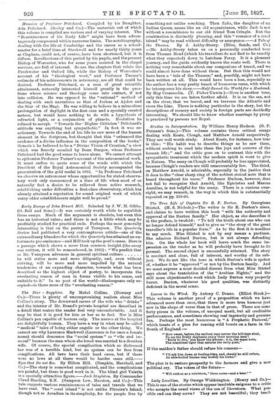Memoirs of Professor Pritchard. Compiled by his Daughter, Ada Pritchard.
(Seeley and Co.)—The materials out of which this volume is compiled are various and of varying interest. The "Reminiscences of his Early Life" might have been advan- tageously compressed within narrower limits. The autobiography, dealing with the life at Cambridge and the career as a school- master for a brief time at Stockwell and for nearly thirty years at Clapham, could not, of course, have been shortened, but it is diffuse. Recollections of this period by his pupils, and the present Bishop of Worcester, who for some years assisted in the chapel services, are full of interest. So are the chapters that relate the Freshwater and Oxford life, while the Bishop of Worcester's account of his "theological work," and Professor Turner's estimate of his achievements in astronomy, are all that could be desired. Professor Pritchard, as a man of great scientific attainment, naturally interested himself greatly in the ques- tions where science and theology come into contact, if not into collision. He was opposed to the " rational " method • of dealing with such narratives as that of Joshua at Ajalon and the Star of the Magi. He was willing to believe in a miraculous prolongation of daylight in the first case and a specially created meteor, but would have nothing to do with a hypothesis of refracted light, or a conjunction of planets. Evolution he refused to accept. "Towards the Higher Criticism' Pritchard's attitude was anything but sympathetic." In fact it was re- actionary. Towards the end of his life he saw more of the human element in the Scripture, but thought that this "enhanced the evidence of a divine influence in the composition of the books." Genesis i. he believed to be a "Divine Vision of Creation," a view which was fiercely assailed by Dean Burgon, whom Professor Pritchard had the good sense to leave alone. We cannot attempt to epitomise Professor Turner's account of the astronomical work. It must suffice to quote some of the words with which the President of the Royal Astronomical Society accompanied the presentation of the gold medal in 1885. "In Professor Pritchard we observe an astronomer whose opportunities for stated observa- tory work only commenced at a time of life when most of us naturally feel a desire to be relieved from active research, establishing under difficulties a first-class observatory, which has already attained a reputation for sound original work of which many older establishments might well be proud."


















































 Previous page
Previous page